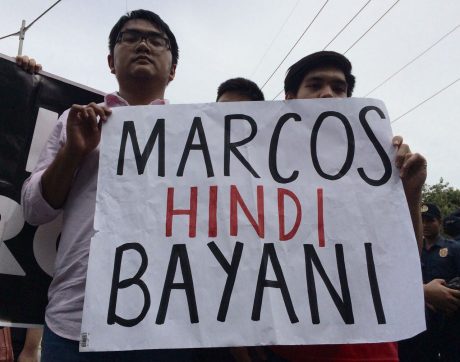
It is tempting to think of the unresolved issues with the Marcos family – their alleged ill-gotten wealth, the lack of compensation for all those who supposedly suffered during the Martial Law era, and now the purportedly “undeserved” burial of the late strongman Ferdinand Sr. at the Libingan ng mga Bayani (LNMB) – as political issues that the people should forever be reminded of. As long as there is even just one member of that Marcos clan remaining on God’s green earth, he/she, and all other Filipinos, should be constantly reminded that that family is tainted with original sin.
Thirty years down the line, however, and with no settlement or resolution in sight, certain influential forces still insist on blaming only the Marcoses and those who show even the slightest bit of “support” for them. Current president Rodrigo Duterte has also copped his share of criticism for not stopping the burial. Critics of Duterte and the Marcoses claim that while no law stops the burial, no law compels him to proceed with it either. Duterte, however, true to his campaign promise, defended his decision not to change his mind on it.
Things don’t work that way. Blaming the Marcoses for the lack of resolution has its limits. No doubt that certain powers-that-be would like to keep that from Filipinos in order to hide their own shortcomings in “doing their part.”
Here in Get Real Post, we assert that the social, political, and economic issues that Filipinos face will always stem from the cultural issues that they have. The issues with the Marcoses – particularly the lack of resolution of them – are no exception. In fact, they present a strong indictment of certain cultural dysfunctions that Filipinos have refused to flush out of their systems
There is a strong indictment of pwede-na-iyan. Those who opposed the burial, claim that Duterte is solely to blame for the “predicament” because he shouldn’t have rocked the boat. All the presidents who came after the Marcoses didn’t touch the issue. Ask, however, of a law that explicitly bars Ferdinand Sr. from being buried there, and you get…crickets.
“But, but, the spirit of the 1987 Constitution was that it was a response to the Marcos excesses!”
All the same, you cannot legislate what is not explicitly stated. Diba, lawyers and wannabe lawyers?
Blaming Duterte for “rocking the boat”, because you didn’t plug the loopholes yourselves, is, quite simply, a loser’s retort. The bottom line is, 30 years of post-Marcos government, most of it still influenced by the LP and Yellowtardism, did nothing to prevent the burial.
There is a strong indictment of bahala na. The way the Marcos issues have been handled, the burial being just one of them, remind me of the way Filipinos generally regard maintenance of equipment. Pwede na iyan, total tumatakbo pa. (That’ll do, it’s still running anyway.) But once it breaks down, however, they are usually panicky, helpless, and clueless as to why it did.
In addition, as GRP webmaster benign0 has pointed out, the anti-Marcos movement has yet to articulate any sort of endgame. Ano ba gusto talaga nila mangyari? (What do the people really want to happen?) What is the plan to hold the Marcoses accountable, finally? What do people have to help them in their quest? What is the alternative if they do not get what they want?
The answer to all those questions, so far, seems to be: nothing. Perhaps the anti-Marcos movement just wants Filipinos to keep on crying, “Never Forget”.Bahala na.
Problem is, not everyone wants to keep on crying with them. Not because they believe Marcos was a saint, but simply because they don’t see the point in continuing to do so anymore.
There is a strong indictment of Filipino-style democracy. Among those who are anti-Marcos, some say that their ongoing fight against that family should not be reduced to a family feud between the Aquinos and the Marcoses. Rather, it should be viewed as “people of the Philippines vs. the Marcoses”.
The trouble with that statement is that, post-Marcos, the people chose the Aquinos and their ilk to represent their interests. Or maybe so they thought.Whatever the reason post-Marcos governments have (e.g. the Marcoses “were not cooperating”) for not being able to resolve the Marcos issues (e.g. throw them in jail), the net result is that the people have failed because their representatives have failed, despite the power of an entire legitimate government behind them.
Filipinos, however, until now, fail to understand that in institutions like democracy, rights accorded have corresponding responsibilities. The biggest responsibility that they fall short in is to keep their leaders accountable. Filipinos have seemingly assumed that democracies run themselves, especially after the votes have been cast.
Laws don’t implement themselves, and issues don’t solve themselves; it takes active deeds, active participation from all the people, to make these things happen.
Remember that the anti-Marcos movement asked the Supreme Court (SC) to decide on the matter. The SC decision was one they didn’t like. What happened? They cried foul against the SC.
They played by the rules of democracy. They played by the rules of the law. They didn’t get what they want, so no they cried foul, and persecution, and are currently trying to revive the extralegal “People Power” movement.“Getting what you want” is not always the outcome of “playing by the rules.”
But the rules need to be followed nonetheless.
It is becoming more and more preposterous, as time goes by, to hear Filipinos blame their misfortunes solely on one man or group of people.
The underlying question that needs to be answered is: How long will it be until Filipinos get that their cultural dysfunctions are leading them to ruin?
http://www.getrealphilippines.com/blog/2016/11/unresolved-issues-marcoses-strong-indictments-filipino-cultural-dysfunction/

No comments:
Post a Comment